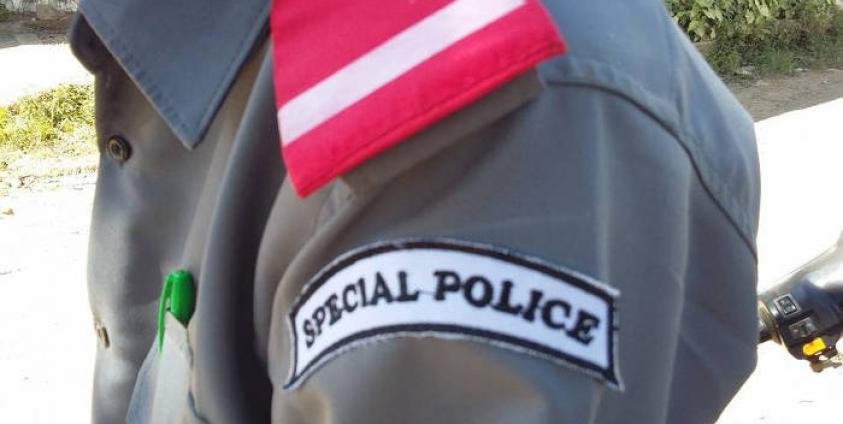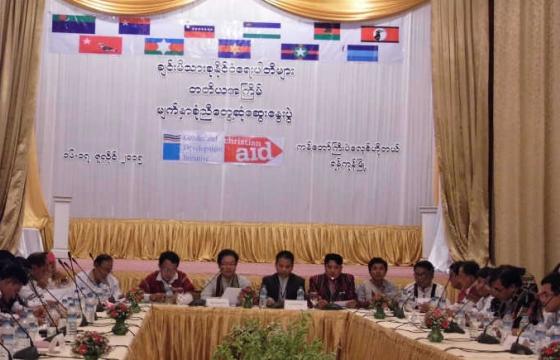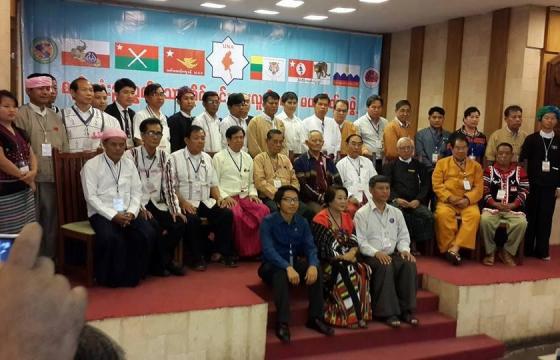Salai Kyaw Moe — “Attention, everyone! Stand at Ease! Stand Easy!” The loud commands can be heard from near the Bontalar Hall in Matupi town, even if one doesn’t want to hear it. Behind the noise are a group of men moving in line in matching uniforms. Onlookers watch from all sides with amusement, sometimes whispering to each other.
The people shouting in unison that are being led by Matupi Township police chief are special police officers tasked with providing security for the election. Already they have been engaged in drills for nearly an hour. Completely attentive to their instructions, the newly recruited officers seem unaware of the passing of time. They also seem oblivious to the residents that have gathered to watch with interest, some even laughing at the spectacle.
With his tall height and dark skin Ko Salai (not his real name) stands out from the other recruits. Although physically strong he’s sweating profusely, perhaps due to his older age. Exhausted, Ko Salai breathes heavy with an open mouth. He travelled for two days from his village to reach Matupi; Chin State’s second capital.
The rigorous training is new for Ko Salai, who only recently accepted the special police duty after being instructed by his ward administrator. There was little interest in the special police officers’ positions announced several months ago in state-owned newspapers. So, police and authorities from each township, administration, ward and village administration jointly summoned a man from each area, Ko Salai said.
Although the benefits and qualifications for the positions were clearly stated in the newspaper’s ads, Ko Salai who is fifty; older than the age restriction, said he was 45 when he was summoned out of fear. However, with deep set wrinkles and an older demeanor, anyone could guess his real age
“When I came back from cutting trees in the forest the ward administrator called me to tell me I had to attend the special police training in Matupi, and everything has been arranged. I was confused, what do I have to do with the special police? Still, we have to go when we are sent by our [ward] elder. We have to do what we are told,” he says with a moan.
When told that he must become a special police officer, Ko Salai said that he stared at his ward official with disbelief.
“Actually, I never even dreamed of becoming a special police officer. The only uniform I have is a hat and an old pair army pants that I have been wearing to cut tree since I was young,” he said wiping the sweat from his face and looking up to the sky.
Ko Salai’s arms and legs are scarred from machetes and mattocks; tools that he used working in the forest since he was a child.
The special police training included military parade drills, police ethics, and general instructions needed to carry out duties at polling stations on election day.
“People from my village know what kind of person I am. I’m a nobody that cuts trees. Who is going to respect a special police officer like me on election day? Who will listen to me? Now, I will have to give them instructions. Will they respect this? Will we be able to control them?” Ko Salai says in a low voice filled with obvious doubt.
He also worries if the new job will be enough to support his wife and family of five.
“We get paid but our meal expenses are taken from out salaries. Well, we have to pay for what eat but they should have at least given us the training equipment for free. We have to buy it ourselves. The worst thing is I paid my own travel costs to come here. In some villages, it takes two days to get here. They have to hire a motorcycle, and this will cost over 50,000 Kyats. So, in the end being a special police officer for one-month is like a voluntary service,” he said rubbing his sore muscles.
For many of the new recruits hailing from remote areas, their salaries minus expenses will be less than money they could make from their regular jobs.
“I worry about if my family is living well. My wife doesn’t isn’t good with business and doesn’t know how to farm. I won’t have much money when I’m come home and will even have to hire a motorcycle to return home,” Ko Salai said.
The special police officers receive 120,000 Kyats for their monthly salary. One-thousand Kyats is deducted each day for meals. During their training period they must pay 2,500 Kyats for their food. Police uniforms are provided to each new recruit but they have to pay 1,200 kyats for their training books.
“We became special police officers on Oct. 15. Our instructors informed us that we have been selected in line Myanmar Police Act section 27, 28, 29 & 30. On election day we have to guard outside the polling station within five-hundred yards. We can only go inside if the polling station officers call for us,” Ko Salai said.
Typically, there is a general lack of interest in joining the Myanmar police force, probably because they aren’t respected by the public, especially where in the areas where many ethnic populations reside. In these locations, police officers are usually drafted from each township, district, and region, but rarely are assigned to their respective areas of residence, or in Chin State for that matter.
Matupi has one of the most poorly developed telecommunication infrastructures in the whole of Chin State. There aren’t GSM or Telenor services available, only MEC. Yet, good communication is important for ensuring the security of the special police officers.
“Currently, motorcycles have been arranged to travel from one place to another. We have been told that voluntary firefighters will accompany us to provide security,” Ko Salai said.
Over forty-thousand special police officers have been appointed across the country for election day; one-thousand and thirty-one are from Chin State.
Matupi has one-hundred and nineteen polling stations and each one has one officer assigned to provide security. At the time of press it’s unknown how many men like Ko Salai have been drafted to become special police officers.
“I don’t want to do this job. I’m only doing it because I have no other choice.” he said just before ending the interview to return to his training.
Translated by Thida Linn
Edited by BNI staff






